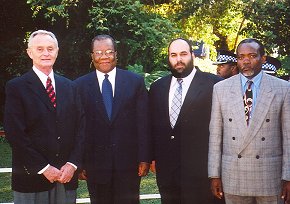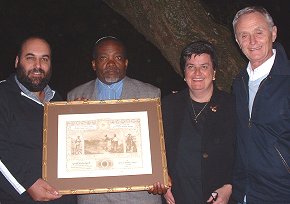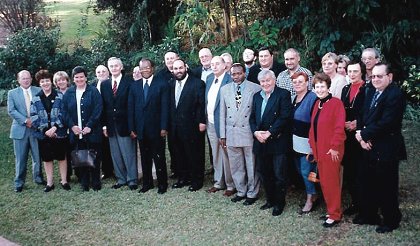|
9th ANNUAL CONGRESS – SWAZILAND
His excellency the prime minister of swaziland - dr barbanas sibusisu dlamini flanked by local and foreign participants of the 9th annual conference of the ajc - swaziland
The African Jewish Congress (AJC) intends to play a meaningful role in the new African Union (AU) due to be inaugurated in South Africa this month. This was the consensus reached by delegates to the AJC’s 9th annual conference held in Swaziland – Africa’s last traditional kingdom – in June.
The AU, which is loosely modelled on the European Union, replaces the Organisation for African Unity and is set to be the driving force in the proposed African Renaissance, bringing peace and stability to the continent.
Mervyn Smith, chairman of the AJC, said it would be investigating ways of linking into the AU or even being affiliated to the organisation. “We’ve spoken to the members of our constituent countries and they will be speaking to their governments to see whether there is some role that the African Jewish Congress can play in the African Union, both in respect of its Jewish communities and in respect of a more fair-handed approach towards the Middle East position and promoting Israel’s side of the story, which often seems to be neglected,” he said.
The AJC wished to support Jews living in smaller communities in dealing with issues arising out of the intifada. “We want to know from you how you are coping and how we and the Israeli ambassador can be of assistance to you,” he added.
The AJC – an affiliate of the World Jewish Congress – is the representative body of the small and far-flung Jewish communities in sub-Saharan Africa and is committed to ensuring their future by linking them to each other and monitoring and combating anti-Semitism. “We are the spiritual and Jewish link that these communities have, a kind of back-up system,” said Rabbi Moshe Silberhaft, spiritual leader to the AJC, who is based in South Africa and visits each community at least once a year.
Head of the Jewish community in Swaziland and co-host of the conference is a black South African, Geoff Ramokgadi, who while not yet converted, practises as a Jew. He is fully versed in the rituals and tradition of the religion – largely self-taught since his decision to register for Orthodox conversion with the Johannesburg Beth Din 12 years ago - and succeeds in holding the 50-strong Swazi Jewish community together. He sports a kippah, speaks Hebrew and sprinkles his conversation liberally with Yiddish expressions.
At the conference, he was presented with a Jewish National Fund Golden Book Certificate “in recognition and appreciation for his unfaltering dedication and commitment to the Swaziland Jewish community”.
Opening the conference, Swaziland’s Prime Minister, Dr Barnabas Dlamini, said the country respected its Jewish community and appreciated the contribution it had made. “The Jewish community is small, numbering in the tens rather than hundreds, but over the years it has had quite an influence on the development of our country. The names Kirsh and Goldblatt will be remembered long after their time,” he said, referring to two well-known entrepreneurs.
“Members of the community have made a significant contribution in a number of areas of professional life, including the legal profession,” he added. The country’s chief justice, Mr Justice Stanley Sapire, is Jewish as was a former attorney-general, David Cohen.
Referring to “an ambitious new education project” that the community is presently involved in, Dlamini expressed the wish that it would act as “an effective catalyst in achieving further integration and peaceful co-existence of the different communities.”
The above-mentioned Kalman Goldblatt – who later changed his name to Kal Grant – arrived in Swaziland from Lithuania at the age of 17 some 70 years ago and set about building his fortune through operating several trading stores and developing the first townships in the country. He was an eccentric, owning a number of exotic cars including a white Cadillac that had belonged to Elvis Presley.
When he died, he was buried according to Jewish custom in a simple pine coffin. The Swazis, who go in for elaborate burials, were astounded that a man of such wealth should be buried in such a humble manner and the story made the pages of the local newspaper under the headline “Millionaire receives pauper’s burial”!
In earlier years, Jewish immigrants to the country entered into liaisons with the indigenous women, with the result that many Swazis today bear Jewish surnames. Among them, a former cabinet minister and a leading businessman both openly acknowledge their Jewish roots, with the latter donating money and time to Jewish projects in the country.
Addressing the conference, Israel’s Ambassador to South Africa, Tova Herzl, said a primary cause of concern was the dichotomy between Israel’s relationship with individual sub-Saharan countries and what happened in multi-lateral fora. “We have good relations with countries in Africa on a bilateral basis, but as a group, they condemn Israel strongly,” she noted.
She expressed the hope that one of the changes brought about by the African Union would be an end to “knee-jerk and very one-sided resolutions”. “Israel has a lot to contribute to Africa, but unfortunately some of this rhetoric does tend to create an atmosphere which could be problematic.”
Israeli Ambassadors in African countries had made approaches to government ministries to alleviate the situation, she said. “We would like to have a relationship with Africa - there probably isn’t any other country in the world that has the kind of experience which is so easily applicable here. We would like to be engaged directly through Jewish community projects like Tikkun (the South African Jewish community’s upliftment initiative), as well as indirectly through the United Nations and its agencies.”
Paying tribute to Chief Executive Officer of Tikkun, Herby Rosenberg, Herzl expressed the wish that similar projects be replicated throughout the continent. “It is highly beneficial to the Jewish community and the State of Israel that he chooses to channel his social involvement through the Jewish community,” she said.
There were some awkward moments when members of the Swazi Jewish community expressed anger at the precipitate closure of the Israeli Embassy in the country a few years back. “Swaziland has kept diplomatic relations with Israel in good times and bad – you should have at least left someone here,” said Ramokgadi.
Technical co-operation had been provided on an ongoing basis during the time of the Embassy, creating much goodwill. Israel had not been seen in the same light since and the resulting vacuum had allowed for Muslim influence, added Dror Torgeman.
Herzl said there were no plans to open an embassy in the country because of budgetary constraints, but she hoped to be presenting her credentials shortly and including the country in her ambit.
Marlene Bethlehem, president of the South African Jewish Board of Deputies, said the South African government had been under “huge” pressure from Moslem countries to break off ties with Israel. “President Thabo Mbeki has said categorically that this will not be done,” she assured the delegates. He had also been “very concerned” to hear that the Jewish community was feeling insecure.
South Africa had not experienced the levels of anti-Semitism seen in Europe because of the government’s tacit support for the Palestinian Authority, she said, adding that it had recently become more even-handed. On the issue of the Moslem population here, the Board had met with Palestinian Authority spokesperson Hanan al Ashwari, who had said she had never seen such radical support for Hamas as existed in the Western Cape region.
Commenting on the “harsh language” on the Middle East in a joint communiqué issued after Mbeki’s visit to Libya this week, Bethlehem said one had to understand the historical ties between the African National Congress and the Palestine Liberation Organisation and others. “That is the reality like it or not. They were helped during their years in exile by these people.”
Delivering his report on the various communities comprising the AJC, Rabbi Silberhaft told delegates that the Muslim president of Mauritius had, because of the special relationship between the two, attended the Jewish community’s Yom Ha’atzmaut celebrations. “I must be the only Muslim in the world to be attending such a ceremony,” he had joked at the time.
In Kenya, President Daniel arap Moi demonstrates his high regard for Israel by providing six of his personal security guards to secure the shul grounds as well as assisting in like manner at the Israeli Embassy. In Zambia, an interfaith consecration of a cemetery by a rabbi, a priest and an imam had taken place.
Commenting after the conference, Smith said the AJC was “particularly pleased” that chairman of the Zimbabwe Jewish Board of Deputies, Peter Sternberg, was able to report on the situation in that country. “If anything does occur in Zimbabwe that will impact on the Jewish community there, it will fall to the Jewish communities in the surrounding countries, particularly South Africa, to assist them. We are at the ready, but hopefully nothing will occur to necessitate this support,” he said.
At a farewell barbecue, delegates were treated to a display of traditional Swazi dancing and a sangoma (witchdoctor) was on hand to “throw the bones”. |


